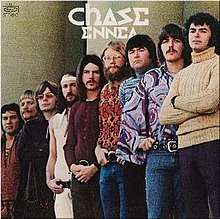Ennea
| Ennea | ||||
|---|---|---|---|---|
 | ||||
| Studio album by Chase | ||||
| Released | March 1972 | |||
| Recorded | San Francisco, California | |||
| Genre | Jazz-rock fusion | |||
| Length | 41:26 | |||
| Label | Epic | |||
| Producer | Frank Rand, Bob Destocki | |||
| Chase chronology | ||||
| ||||
| Professional ratings | |
|---|---|
| Review scores | |
| Source | Rating |
| Allmusic | |
Ennea was the second album by jazz-rock fusion band Chase. It did not repeat the commercial success of their debut album, mostly due to the lack of a top 40 hit and the extended suite to Greek Mythology on side 2, which lacked the "commercial appeal" the first LP had. Ennea is basically a further refinement of the trumpet-rock innovations from the first LP, yet while the first album made its greatest impact in the sheer novelty of four trumpets plus a rock rhythm section, Ennea begins to explore the possibilities of this lineup and to challenge it. On this album, the group pull out all the stops and musically almost thumb their noses at BS&T and Chicago.
The original lineup from the first album was changed midway through the recording sessions, with Gary Smith taking over from Jay Burrid on drums and G. G. Shinn replacing Terry Richards on lead vocals. Sessions for the recording occurred in late August 1971 and again late October through early-mid November 1971 at CBS/Columbia Studios in San Francisco. The cost of the album went $120,000.00 over budget.
The six songs on side two of the album comprise a jazz suite entitled "Ennea", with lyrics based on Greek mythology. The album's title is the Greek word for nine, a reference to the nine band members. The lyrics to the suite were written by Bill Chase's longtime lady companion Erin Adair. The tune Cronus was originally used as an instrumental.
The single "So Many People" (written by Paul Williams and performed by both he and The Neighborhood) saw limited airplay in the U.S. The album charted for just 12 weeks, peaking at #71.
Part of the song "Cronus" was featured in the intro to the Telewizja Polska show "997".
Track listing
- "Swanee River" (Stephen Foster/Bill Chase) – 3:10
- "So Many People" (Paul Williams/R. Nichols) – 2:44
- "Night" (Ted Piercefield) – 2:38
- "It Won't Be Long" (Phil Porter, J. Soukup) – 3:06
- "I Can Feel It" (Angel South) – 2:51
- "Woman Of The Dark" (T. Riley/T. Szollosi) – 5:56
- "Cronus (Saturn)" (B. Chase/Erin Adair/J. Palmer) – 4:46
- "Zeus (Jupiter)" (B. Chase/E. Adair) – 4:36
- "Poseidon (Neptune)" (B. Chase/E. Adair) – 2:27
- "Aphrodite Part I (Venus)" (B. Chase/E. Adair) – 2:02
- "Aphrodite Part II (Venus)" (B. Chase/E. Adair) – 3:36
- "Hades (Pluto)" (B. Chase/E. Adair) – 3:34
Personnel
- Bill Chase - Lead & Solo Trumpet
- Ted Piercefield - Trumpet, vocals on "Night"
- Alan Ware - Trumpet
- Jerry Van Blair - Trumpet, flugelhorn
- Gary Smith - drums except as noted below
- Dennis Johnson - bass guitar
- Phil Porter - Hammond B-3 organ
- Angel South - guitar
- G. G. Shinn - vocals
- Jay Burrid - drums on "So Many People," "Night," "Woman Of The Dark"
- Terry Richards - vocals on "So Many People"
References
External links
| Look up ennea- in Wiktionary, the free dictionary. |